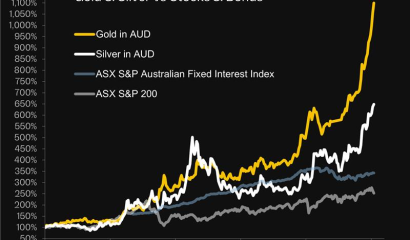Operation Fortune: Golden Guy and systemic risk
Gold is at the centre of the plot of the new Guy Ritchie film, Operation Fortune. If you haven’t seen it – here’s a quick synopsis.
Part of the plot revolves around a nefarious scheme to disrupt the global banking system with stolen AI software – which, they believe, will cause a massive spike in the price of gold (from which, of course, the villains will benefit).
So – how crazy is this scenario?
It’s unlikely that Hugh Grant will steal AI software and cause the global banking system to grind to a halt. However, events putting the banking system at risk? That is not so far-fetched.
One of the many reasons investors include gold in their portfolios, alongside protection from inflation, is protection from systemic risks, including the risk that the banking system itself fails.
What is systemic risk?
Systemic risk is the possibility that an event could trigger severe instability, or collapse an entire industry or economy.
Financial systems and the financial sector are especially vulnerable to systemic risk – more so than other sectors of the economy, because of the complex network of exposures among financial institutions. One bank collapse may affect others, and counterparties and other financial contracts may also affect other positions held (on futures for example). For a fuller explanation about systemic risks to the financial sector check out this previous article.
So on the systemic risk front, Ritchie has identified a real and present threat.
History has shown that systemic risks can have outsized impacts
Systemic risk was a major contributor to the financial crisis of 2008 – cheap credit and lax lending standards fuelled a housing bubble in the US. Sub-prime mortgages were ‘bundled’ and on-sold, leaving banks exposed with trillions of dollars of worthless investments once the housing bubble burst. This systemic risk brought down not only several banks and investment houses, but caused a world-wide recession as the ripple effect impacted almost all developed nations.
In the 1990s Japan experienced a severely deflationary stock market, which caused bank, and real estate crashes – taking almost two decades to recover.
Potential real-world systemic risks
Whilst Ritchie’s AI software scenario probably does belong on a movie screen, there are other risks that have the potential to severely impact our financial systems.
Large cyber breaches on single companies have happened recently. Cyber security is a real and present issue globally – and although thus far, the impacts have been constrained to the companies and their customers, it’s possible that this type of issue could have more widespread impacts – especially in the financial and banking sectors.
Many believe that climate change is also a potential systemic risk and we’re experiencing the early signs of it right now – with severe weather events impacting insurance companies and the institutions that hold them as investments. The floods in northern NSW in Feb 2022 are the second-costliest event in the world for insurers in 2022, and the most expensive disaster in Australian history. Such serious weather events on a broader scale could contribute to a systemic failure.
However, the most dangerous systemic risks are the ones that are hidden – if you can’t see them, it’s hard to plan to mitigate the risk.
So what does this mean for gold?
In times of political and economic uncertainty, investors often flock to the safe-haven asset of gold because, when owned in physical form, gold offers systemic risk protection. This means that unlike most other forms of wealth that depend on the smooth functioning of a wider system in order to retain its value, gold does not.
And historically, in the aftermath of systemic failure, the price of gold is quick to rise. (Guy Ritchie got that right too).
With Rush Gold, you have direct title to gold, stored in your name in vaults in Sydney, so with a systemic failure your gold is safe.
But what if Rush were the organisation to fail? We don’t think it will happen – but even if that were the case, you retain full ownership of your gold under Australian Law. It’s still yours and you would be able to retain the full value whether we’re still around or not.
The golden rule: If you have direct title to gold, then it’s yours – whatever’s happening around you.
So if you see Hugh Grant coming at you looking conspiratorial, you can breathe freely, because you can rely on Rush Gold.



